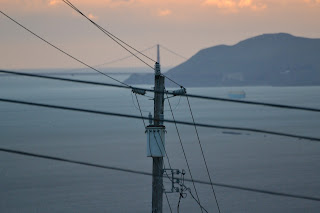When I look around me I cannot help but see the overlays of the "artificial" and the "natural" - trees, power lines, ocean, bridges, buildings, islands and lights. For so long it was normal to see these things as two separate categories - those things built by humans and those things not. But even the trees and the islands have had their share of human hands on them.
So I came up with the term "artinatural" to talk about things that are simultaneously artificial and natural. But my main point perhaps was not to insist on the artificiality of the natural (which is, indeed, a human concept), but rather to see the
naturality of artifice. These words, of course, are all artificial, all socially-constructed (and imperfect I might add) concepts to help comprehend the world and, more basically, to simply function. There was never a requirement that words and concepts be
true, but rather, merely that they be useful. Perhaps this is why things must be separated out, categorized, and defined so narrowly.
Pictures help me think. I look at them and they say something that I never tried to spell in words. They hold their own kind of truth. They are not merely worth one thousand words, they can transcend words. So maybe the word artinatural comes closer to the truth of the photos above. And, although they capture a piece of the artinatural landscape out there, they themselves are artinatural entities consisting of magnetic data, electricity, the workings of the photographers eye - itself both artificial and natural (especially with the contact lenses I wear). Alas, the world is so overwhelmingly complex, intertwined and overlapping....
The subways and roads are like arteries, the buildings like beehives, the lights a clever re-directing of the sun's energy. But this is not to say that the natural is always right, or that it is always meant to be. All of the above are subject to change; they are temporary attributes of the landscape. They may have gotten it quite wrong, actually. The "appeal to nature" (which implies that something is right if it is natural) is fallacious - since nature is in constant flux, and because nature contains all that is both good and bad, one cannot claim that something is good, right, or correct simply because it is natural. Of course, this happens all the time and it should be watched. Again, "nature" needs to be better, and more humbly, understood.




















